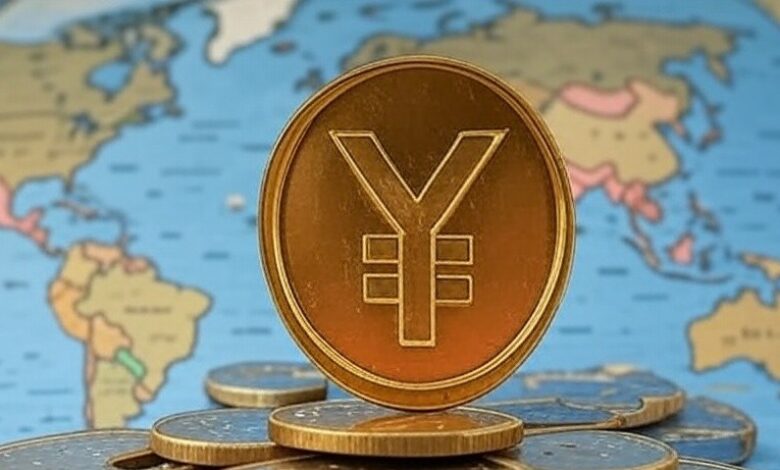China Accelerates Yuan Globalization as Experts Urge Action on Stablecoins

As global confidence in the U.S. dollar continues to waver, China is stepping up efforts to promote the yuan on the world stage—through expanded financial market access, digital yuan initiatives, and calls for the development of yuan-backed stablecoins.
While Beijing has yet to introduce a stablecoin tied to its national currency, state media and financial experts are now urging the government to move swiftly. A recent article in the Securities Times, a publication under the People’s Daily, argued that China must act “sooner rather than later” in creating a regulatory framework for yuan-backed stablecoins, warning that “waiting is not an option” as the U.S. strengthens its dominance through dollar-pegged crypto assets.
Pushing for Global Yuan Usage
The People’s Bank of China (PBOC) has recently outlined measures to reduce “excessive reliance” on the U.S. dollar, including plans for a digital yuan internationalization center in Shanghai and new yuan-denominated trading instruments. Beijing has already launched a digital version of the yuan domestically, aimed at replacing portions of physical cash and coins, and this new center represents a strategic move to expand its global usage.
PBOC Governor Pan Gongsheng emphasized the need to diversify away from the greenback during his keynote at the Lujiazui Forum, signaling a stronger resolve to challenge dollar dominance.
Three major Chinese exchanges—the Shanghai, Dalian, and Zhengzhou exchanges—recently opened 16 new futures and options contracts to qualified foreign investors, covering commodities like lead, tin, and rubber. Analysts suggest these steps aim to raise the yuan’s influence in global commodity pricing and offer hedging tools that reduce dependence on dollar-based benchmarks.
The Shanghai Futures Exchange is also exploring proposals to allow foreign currencies as collateral for trades settled in yuan, signaling growing openness to global participation.
Yuan-Backed Stablecoins: A Strategic Imperative
Unlike volatile cryptocurrencies, stablecoins are digital tokens pegged to fiat currencies and designed to facilitate fast, low-cost transactions. As nearly 97% of the $261 billion global stablecoin market is currently tied to the U.S. dollar, Chinese experts warn that this trend is reinforcing dollar dominance in global trade and finance.
The Securities Times article cited leading economists who say yuan-based stablecoins could help counterbalance this trend and serve China’s broader ambitions for financial innovation, digital payments, and yuan internationalization.
Liu Xiaochun of the Shanghai Finance Institute noted that yuan-backed stablecoins should prioritize serving emerging markets and promoting the yuan’s global role—rather than directly competing with dollar-backed tokens. Other experts suggested launching such stablecoins offshore, particularly in Hong Kong and free-trade zones, as a stepping stone.
While Hong Kong is introducing a licensing regime for stablecoin issuers, the Chinese mainland still bans cryptocurrency trading and has no yuan-pegged stablecoin framework in place. Analysts at China International Capital Corporation (CICC) said reforms at home are still essential to drive true internationalization.
Strategic Timing Amid U.S. Policy Shifts
China’s push comes amid heightened volatility in the U.S. dollar, with the dollar index down over 9% this year. U.S. policy unpredictability and the rapid growth of dollar-backed stablecoins have amplified calls in China to accelerate yuan-focused alternatives.
At the same time, major Chinese exchanges and institutions are increasing offshore yuan lending, especially to emerging markets. Cross-border payments, yuan clearing banks, and offshore financial partnerships are all part of a broader de-dollarization effort.
While yuan-based stablecoins are not yet a reality, Beijing’s intensified rhetoric and policy experimentation reflect a clear trend: the yuan is being positioned as a serious global contender—and stablecoins may soon become a central pillar of that strategy.
The U.S. Moves First with the GENIUS Act
The global race to shape the future of digital currencies is accelerating. While China debates the timing and structure of yuan-backed stablecoins and expands the use of the digital yuan, the United States has taken proactive steps with legislation like the GENIUS Act, recently passed by the Senate. The Act provides a legal framework for dollar-pegged stablecoins, reinforcing the dollar’s dominance in the digital asset space.
If China fails to catch up, the global demand for USD-backed stablecoins may further entrench the dollar’s dominance in international settlements—exactly what China aims to counter.





